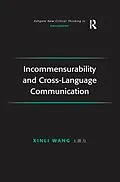A dominant epistemological assumption behind Western philosophy is that it is possible to locate some form of commonality between languages, traditions, or cultures that makes full linguistic communication between them attainable. Xinli Wang challenges this assumption by exploring why and how linguistic communication between two conceptually disparate languages, traditions, or cultures is often problematic and even unattainable.
Autorentext
Xinli Wang is Professor of Philosophy at Juniata College, Pennsylvania, USA.
Inhalt
Contents: The many facets of incommensurability; Incommensurability as untranslatability; Incommensurability and conceptual schemes; In defense of the very notion of conceptual schemes; Case studies: the emergence of truth-value gaps; Toward the presuppositional interpretation; Kuhn's taxonomic incommensurability: a reconstruction; A defense of the notion of semantic presupposition; The structure of a presuppositional language; Existential presumptions and universal principles; Categorical frameworks; The failure of cross-language understanding; Hermeneutic understanding in abnormal discourse; Informative communication breakdown: the transmission model; Dialogical communication breakdown I: Gadamer's conversation model; Dialogical communication breakdown II: Habermas's discourse model; The concept of incommensurability; Bibliography; Index.
